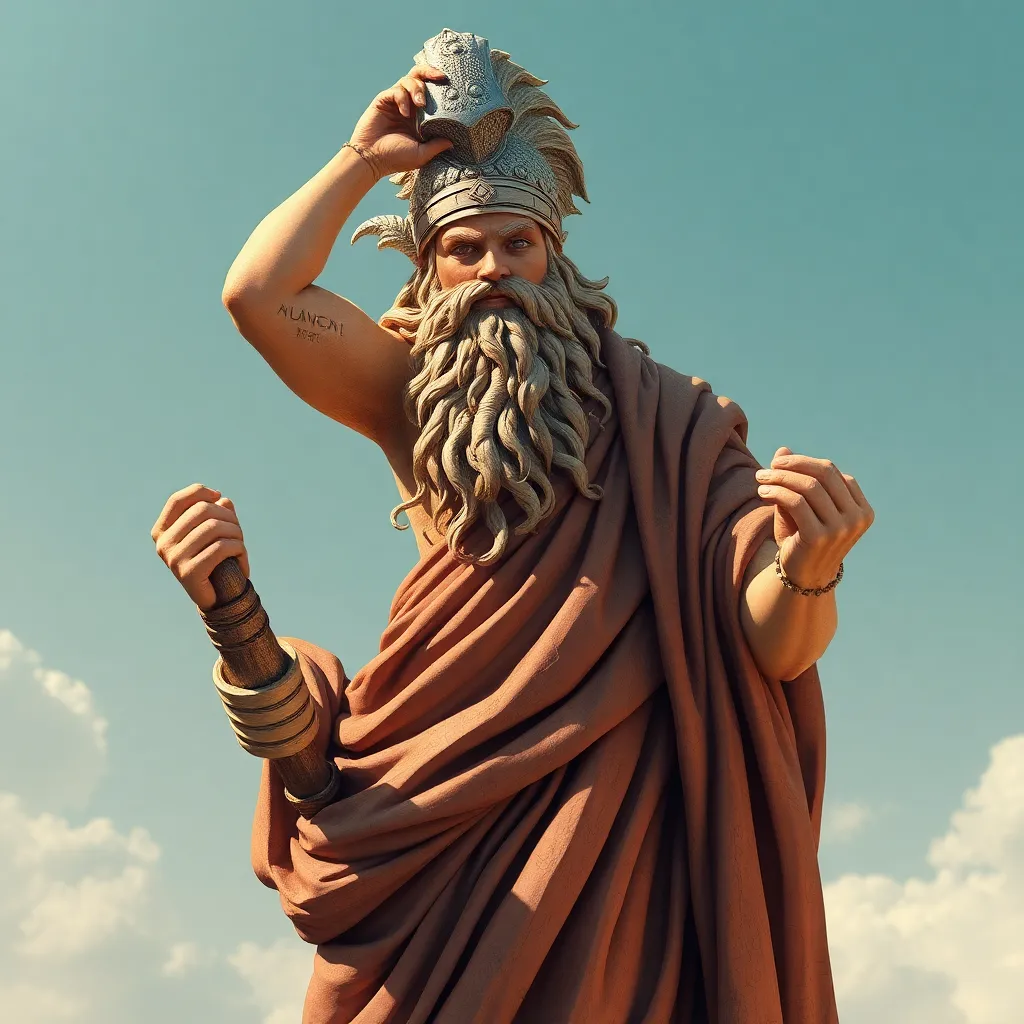Odysseus’s Cunning: The Role of Intelligence in Greek Mythology
I. Introduction
Greek mythology encompasses a vast array of tales, characters, and themes that have shaped the cultural fabric of Western civilization. These myths not only provide insight into ancient Greek beliefs and values, but they also continue to resonate with contemporary audiences. Among the pantheon of heroes, Odysseus stands out as a central figure, renowned for his cleverness and ingenuity.
This article explores the character of Odysseus, delving into how his intelligence and cunning exemplify the importance of wit over brute strength in Greek mythology. Through various adventures and encounters, Odysseus redefines the notion of heroism, showcasing that intellect can be as powerful, if not more so, than physical prowess.
II. The Character of Odysseus
Odysseus, the son of Laertes and Anticlea, hails from the kingdom of Ithaca. His lineage connects him to noble blood, yet it is his intellect that truly sets him apart from other heroes. Often portrayed as a complex character, Odysseus exhibits a range of traits that contribute to his legendary status:
- Cunning: Odysseus is often described as “wily” or “clever,” a testament to his ability to outsmart adversaries.
- Resourcefulness: He possesses the capability to think on his feet and adapt to changing circumstances.
- Adaptability: Odysseus’s journey home is marked by his ability to navigate diverse challenges and foes.
In comparison to other Greek heroes such as Achilles and Hercules, who embody physical strength and martial prowess, Odysseus’s strength lies in his brain rather than brawn. Achilles is renowned for his invincibility in battle, while Hercules is celebrated for his immense strength. Odysseus, however, proves that intelligence can lead to victory even in the most perilous situations.
III. The Role of Intelligence in The Odyssey
The epic poem The Odyssey, attributed to Homer, chronicles the arduous journey of Odysseus as he strives to return home after the Trojan War. This narrative is rich with episodes that highlight his cunning nature:
- The Trojan Horse: Odysseus masterminds the conception of the Trojan Horse, a brilliant strategic maneuver that leads to the fall of Troy.
- Encounter with Circe: When confronted by the sorceress Circe, Odysseus employs both charm and wit to turn her to his advantage, ensuring the safety of his crew.
- The Cyclops: Odysseus devises a clever ruse to escape from the Cyclops Polyphemus, introducing himself as “Nobody” to outsmart his captor.
These key moments not only emphasize the importance of intelligence in Odysseus’s journey but also illustrate the broader theme of strategy and cunning over brute force. His reliance on wit allows him to overcome obstacles that would defeat a less clever hero.
IV. Thematic Analysis: Cunning vs. Strength
Throughout Greek mythology, the theme of intelligence versus physical power is prevalent. Odysseus serves as a prime example of how cunning can triumph over strength. Other mythological figures, such as Athena, the goddess of wisdom, and Hermes, the messenger god known for his cleverness, also embody this theme. These characters highlight that intelligence is not merely an asset but a necessity in overcoming challenges.
Odysseus redefines heroism through his intellect by demonstrating that true strength lies not just in physical capability but in the ability to think critically and adapt to circumstances. His adventures reflect a deeper understanding of what it means to be a hero in a world filled with unpredictable dangers.
V. Cultural Context: The Value of Intelligence in Ancient Greece
In ancient Greek society, intelligence and cunning were highly valued traits. Philosophers such as Socrates, Plato, and Aristotle emphasized the importance of knowledge and wisdom, and strategists like Pericles and Themistocles showcased the significance of intellect in political and military success. Odysseus embodies these societal values, serving as a reflection of the ideal Greek hero who balances strength with intelligence.
The emphasis on cunning is also evident in various myths and stories where characters use their wits to navigate challenges, illustrating that intelligence was viewed as a vital asset in both personal and communal realms.
VI. The Influence of Odysseus on Later Literature and Culture
Odysseus’s legacy extends far beyond ancient Greece, influencing numerous works of literature and culture throughout history. His character can be found in:
- Virgil’s Aeneid: The epic poem features characters and themes inspired by Odysseus’s journey, emphasizing the archetype of the cunning hero.
- Modern Adaptations: Contemporary literature, films, and television often draw on Odysseus’s traits, portraying characters who embody similar cunning and resourcefulness.
- Global Mythology: Odysseus serves as an archetype for cunning heroes in various cultures, demonstrating the universal appeal of intellect as a heroic trait.
His continued relevance in discussions of intelligence and leadership highlights the timeless nature of his character and the lessons derived from his experiences.
VII. Critiques and Interpretations of Odysseus’s Cunning
While Odysseus’s cunning has garnered admiration, it also invites scrutiny regarding its moral implications. Critics argue that his intelligence sometimes leads to morally ambiguous decisions, such as:
- Manipulating others for personal gain.
- Deceiving allies and adversaries alike.
- Using trickery that results in suffering for others, such as the fate of the suitors in Ithaca.
Scholars and critics have diverse interpretations of Odysseus’s character, debating whether his cunning is a virtue or a vice. This complexity adds depth to his character and underscores the nuances of morality in Greek mythology.
VIII. Conclusion
Odysseus stands as a symbol of intelligence and cunning in Greek mythology, illustrating the value of wit over brute strength. His adventures serve as a testament to the enduring legacy of intellect in heroism, a theme that resonates across cultures and time periods. As modern narratives continue to explore the balance of intellect and strength, Odysseus’s character remains a vital reference point for understanding what it means to be a true hero.
Ultimately, Odysseus’s legacy is a reminder that while strength may win battles, it is intelligence that wins wars and shapes destinies.




